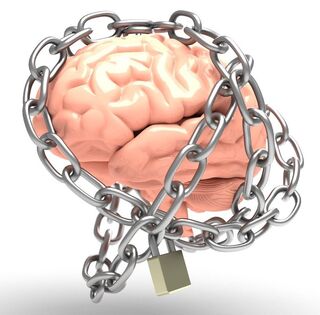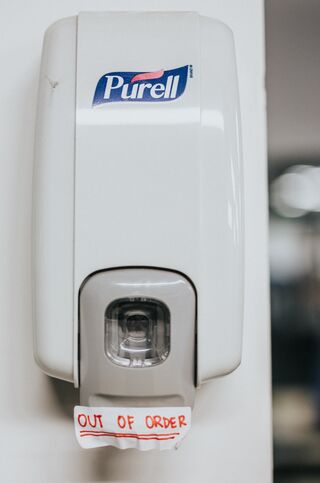There’s a lot out there warning about Covid exacerbating Obsessive-Compulsive Disorder (OCD). There’s information out there warning of false positive Covid results. Unfortunately, there’s nothing warning about potential false positive OCD diagnoses.
OCD fallacies
Remember that person, well before Covid, who had hand sanitizer on a keychain and kept their desk spotless? Remember how people would roll their eyes and comment, “Joe/Jane is so OCD!” Maybe they were, but not likely; they were probably just clairvoyant trendsetters for 2020.
Nowadays, there are people I know that never even washed before eating who would carry Lysol in holsters if they could. But seriously, folks...
Psychological disorder or adaptive (albeit rigid), self-protective habit? Pop culture would have us think the former. Similar to what was mentioned about Bipolar Disorder in Coming to Terms, OCD has become a pejorative adjective. Even before Covid, our pleasantly organized and disinfected acquaintances got a bad rap, their behaviors somehow perceived as pathological.
Or is it? Like Bipolar Disorder, real OCD isn’t nearly as common as one might think given the rate we hear it casually tossed about. According to the Anxiety and Depression Association of America (ADAA) it is a rather rare condition, at a mere 1-2% of the general population.
So, if OCD is not being an organized, clean person, what is it, and does an uptick in hygiene activity during a pandemic mean someone has it?
Let’s be reasonable
Just like someone paying closer attention to possibly having coronavirus symptoms doesn’t make them a hypochondriac, rest assured that a surge in regimented cleaning habits is pretty normal for the Covid era. It’s also OK to be regimented in your organization and cleanliness in general if it is not disrupting your life. Obsessive-Compulsive Disorder implies that such activities are significantly distressing. People with real OCD are flustered by their compulsive behaviors (organizing, cleaning, etc.) and don’t want to have to engage them, but feel compelled to, lest their anxiety be measured on the Richter scale.
More than a neat freak
Let’s take a look at the OCD symptoms and cycle. First, an obsession, clinically defined as in OCD, is a distressing and intrusive thought, image or impulse/urge that the person cannot suppress. These obsessions come out of left field and are ego-dystonic, or, not the kinds of things the person would voluntarily think of. Have you ever, out of the blue, had an annoying song stuck in your head? If so, you have an idea of what it’s like for an obsession set in. Unfortunately, in OCD, obsessions persist and wreak havoc. Interestingly, like singing that annoying song may get it out of your head, I’ve had patients sing their obsessions to good effect, defanging scary thoughts by trivialization.

Compulsions are behaviors, often ritualistic in nature, that sufferers engage in to try and feel control over the obsession and thus quell associated anxiety. The average OCD sufferer spends 3 hours per day ritualizing. If that sounds extreme, just read the book Life In Rewind! Unfortunately, though well-intended, compulsions merely reinforce obsessions by showing them they are to be feared. This leads to relentless, painful "brain lock" as noted by Jeffrey Schwartz, MD, in his book of the same name.
Examples of intrusive thoughts and corollary compulsions:
- A middle-aged man with years of untreated OCD spontaneously thought, “What if I accidentally communicate something that could falsely imprison me?” In turn, he didn’t speak for seven years, and any written correspondence he supplied was checked for hours to be sure nothing of the sort was in a letter.
- An ex-competitive swimmer confessed a long history of thinking they could somehow be contaminated. The only place they felt safe from germs was in a chlorinated pool, so made the best of it and became a champion athlete. Once married, they demanded their spouse and children ritualistically cleaned before entering the house or touching them.
Examples of intrusive images and corollary compulsions:
- A loving mother of a newborn has a flash of abandoning the baby in a parking lot and driving off. She naturally thought, “Oh no! What if I did do that?” or “Do I really mean that?” despite knowing she wouldn’t do such a thing. She forced herself to repeatedly think of the scenario to make sure it was still anxiety- provoking, thus proving to herself it wasn't something she really wanted to do, and refused to go out with the baby alone, “just in case.”
- A patient noticed a plane flying by and a vision flashed in their mind of it crashing. Immediately, they felt that if they didn’t tap their steering wheel in a particular pattern while looking in the direction of the plane to make sure it was still airborne, it may crash and it would've been their fault (oftentimes obsessions and their compulsions have no shred of logical connection.)
Examples of intrusive impulses/urges and corollary compulsions:
- A 14-year-old boy became overwhelmed by an impulse that made it seem he'd take the knife he was using and slice his wrists. After this, he refused to go near the cutlery drawer and made his parents put out plastic knives with dinner. Further, he had to watch both parents run the knife over their finger three times each to be sure it wasn't possibly sharp enough to cut flesh on one stroke, so they would have time to restrain him if the impulse came to fruition.
- Many impulse/urge obsessions are less severe, such as a feeling that something is out of place, and the person is compelled to nudge it around until it “feels right.”

Second opinion
So, a little different from “She’s so OCD,” for a spotless, neat desk, eh? Pop culture struck again, making a stigmatizing mockery of a serious condition by reducing it to a neurotic adjective. The lesson? “OCD” is much more complicated than people who enjoy being organized and/or clean. More often than not, these preferences are nothing more than a hardened habit.
On that note, Covid is no doubt exacerbating some bona fide OCD patients’ germ obsessions. It perhaps could trigger OCD in people prone to the condition (normal onset is in childhood). But remember, before any knee-jerk considerations of an OCD diagnosis for cleanliness “obsessions” during the current reality, it’s presently more pathological if people aren't showing ultimate control of their hygiene and personal space. Things are anxiety-provoking enough in 2020, patients don’t need the additional stress of being told they have a serious mental illness when one likely isn’t there.
References
Anxiety and Depression Association of America (2020). Understand the facts: Obsessive-compulsive disorder. https://adaa.org/understanding-anxiety/obsessive-compulsive-disorder-ocd
Schwartz, J.M. (2016). Brainlock: Free yourself from obsessive-compulsive behavior (20th anniversary edition). Harper Perennial.
Weible-Murphy, T. (2010). Life in rewind. Harper Collins.




